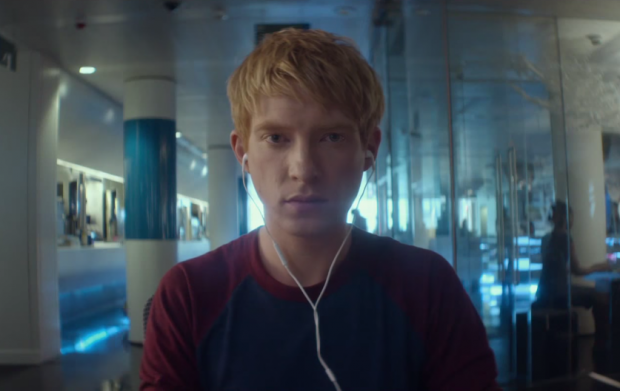It’s taken me over a week to write about Ex-Machina, not because I’ve been too busy (although I have) but unfortunately because I saw it on the same day as the previous two films reviewed on this blog. Comparisons may be odious but sometimes they make even a reasonably good film seem a bit lame. And Ex Machina IS reasonably good, but misses the mark on quite a few levels.
Alex Garland’s had a long run-up to this, his directorial debut. It’s a solid gold fact that the man knows his sci-fi. Sunshine, his second joint project with Danny Boyle was entertaining even if it contained more sly references and obvious rip-offs than was, perhaps, decent. Meanwhile his reworking of Judge Dredd’s basic building blocks into a second attempt at bringing Mega City’s law-enforcer to the screen was just magnificent. And yet what hampers Ex Machina is both its failure to ultimately surmount cliche as well as the disappointing development of what could have been some interesting variations on the hackneyed idea of man-made life and the consequences that lie therein.
Ex Machina basically takes all of the previous templates for the dangers of man playing God, from Metropolis to Spielberg’s A.I. and tries to give it a spin based on (presumably) Stephen Hawking’s recent warnings of the dire consequences of such actions (in short: as soon as machines gain sentience we’re fucked). The idea has become common cinematic fodder recently, in our post-Syri world so it’s little surprise that this aspect of the plot feels rather worn. It even formed the basis of an episode of Elementary. And last year we not only got the truly woeful Johnny Depp vehicle about merging man and machine, Transcendence, but also Scarlett Johanssen in not one, but TWO films exploring the concept (Her and Lucy): both equally terrible albeit for different reasons. Her was glib and pointless while Lucy was just hackneyed shoot-‘em-up schlock.
This is not to say that Ex Machina is anywhere near as bad as these films. It shares the underground research facility meme with Transcendence, but there any similarities cease. Garland’s scripts are never dumb and the setting of Ex-Machina is a far more believable ultra-chic modernist lair set not in a desert but in the northern wildernesses and filled with glass and cool concrete. The performances here are also much finer. Both male leads are actors who deserve close attention. Oscar Isaac (who was superb as Llewyn Davis), portraying Nathan, the billionaire tech as an odious, manipulative creep is great, while Domhnall Gleeson is also excellently dazed and confused as Caleb, the office nerd who seemingly gets granted the golden ticket to visit Nathan’s Willy Wonka-style research facility. Meanwhile Alicia Vikander transcends her role as sexy robot, Ava to make her possibly the most sympathetic character in the whole film.
Well, so it seems at first, when Caleb has been helicoptered to the wilderness to seemingly test the true self-awareness of Ava, but, of course, there are far more sinister things at stake here. In tone the initial third of the film felt closest to John Fowles’ masterpiece, The Magus. And of course a single, lonely, awkward coder is the perfect dupe to fall for the sexual mind-fucks which subsequently arise.
But it’s in the portrayal of Nathan that the film has its most interesting thread. Here Garland dissects the kind of Wire-reading uber-jock who both parties and practices physical self-improvement hard. He calls Caleb ‘bro’ and bud’, has a truly annoying beard and talks in horrid 21st century cliches. Unfortunately the film’s transparency doesn’t allow for you to feel anything but repulsion for the man, and his manipulation of Caleb is patently obvious from the start, defusing any plot twists in the final third. Yet Garland’s obvious critique the Schmidts, Zuckerbergs and Jobs of this world who assume the cloak of liberal progress while perhaps harbouring far more sinister motives for mankind could so easily have reaped really interesting results.
Ava’s final (inevitable) revolt also contains the seeds of some interesting notions. Based on the predication that once men, are given godly powers (or the internet) it will only be a short matter of time before ether use it for some kind of pornographic ends, the film dares to position itself as a post-feminist fable. Yet here sisters (and robots) are still doing it for themselves in high heels and designer dresses, even if ( a little like another Johanssen performance in Under the Skin) they use these feminine whiles to gain their bloody revenge. There’s a glimmer of intrigue in the notion that - just maybe - AIs could already be amongst us, we just don’t know it. But Ex Machina takes too long trying to look cool to really thoroughly explore any of these innovations.
Again like Sunshine, Garland lifts plot lines and references wholesale: the notion of browsing history as a method of measuring man’s behavioural patterns is (if anyone’s interested) is lifted from the abortive BSG prequel, Caprica, for starters. And just about anyone who’s seen a movie about creating artificial intelligence knows, it’s hardly ever going to work out well.
Ex Machina does have a few things to recommend it. The portrayal by Vikander of Ava is initially tender and nuanced enough to recreate the same sadness that pervades Spielberg’s AI. This seeming bewilderment at her own creation is oddly touching. And there is a point in the movie where you genuinely start to wonder exactly who is real (just as Caleb questions it himself once he’s figured to the extent of his role as unwitting pawn). But ultimately Ex Machina is merely a very diverting one hour and 40 minutes, instead of the truly original, intelligent science fiction film that we deserve. Still, one hopes that Garland will keep trying.









.jpg)





















